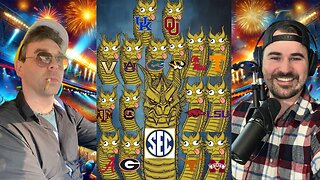Premium Only Content

Surah Quresh-Surah Quraysh #quranrecitation #religion #islamicvideo #qurantilawat #tilawat#quran
Tilawat by El Sheikh Ahmed Bib Aly Agamy Goz' Amma
El Sheikh Ahmed Ben Ali
MeccaSurah QurayshAyahs4Revelation PlaceMeccaNameThe Surah has been titled after the word Quraish in the very first verse.Period of RevelationAlthough Dahhak and Kalbi regard Surah Quraysh as a Madani Surah, a great majority of the commentators are agreed that it is Makki, and a manifest evidence of this are the words Rabba hadh-al-Bait (Lord of this House) in this Surah itself. Had it been revealed at Madinah, the words "this House" for the Ka'bah could not be relevant. Moreover, its subject matter so closely relates to that of Surah Al-Fil that probably it was revealed immediately after it, without any other Surah intervening between them. On this basis exactly, some of the earliest scholars regard the two Surahs as one entity. This view is strengthened by the traditions which say that in the Quran copy belonging to Hadrat Ubayy bin Ka'b these two were written as one Surah, i.e. without the insertion of the Bismillah between them. Furthermore, Hadrat Umar had once recited the two Surahs as one in the Prayer. However, this view is not acceptable because in the Quran copy which Hadrat Uthman (may Allah bless him) had got written down officially by the cooperation of a large number of the Companions and sent to the centers of Islamic lands, the Bismillah was written between these two Surahs, and since then these two have been written as separate Surahs in all the copies of the Quran everywhere in the world. Moreover, the style of the two Surahs is so different that they manifestly appear as two separate Surahs.Historical BackgroundTo understand the Surah well it is essential that one should keep the historical background relevant to the contents of this Surah and of Surah Al-Fil in view.The tribe of Quraish was scattered throughout Hijaz until the time of Qusayy bin Kilab, the ancestor of the Holy Prophet (upon whom be Allah's peace). First of all, Qusayy gathered his tribe in Makkah and this tribe was able to gain authority over the Ka'bah. On that basis Qusayy was called mujammi (uniter, assembler) by his people. This man by his sagacity and wisdom founded a city state in Makkah and made excellent arrangements for the welfare of the pilgrims coming from all over Arabia, with the result that the Quraish were able to gain great influence among the Arabian tribes and lands. After Qusayy, the offices of the state of Makkah were divided between his sons, Abdi Manaf and Abd ad-Dar, but of the two Abdi Manaf gained greater fame even during his father's lifetime and was held in high esteem throughout Arabia. Abdi Manaf had four sons: Hashim, Abdi Shams, Al-Muttalib, and Naufal. Of these, Hashim, father of Abdul Muttalib and grandfather of the Holy Prophet, first conceived the idea to take part in the trade that passed between the eastern countries and Syria and Egypt through Arabia, and also to purchase the necessities of life for the Arabians so that the tribes living by the trade route bought these from them and the merchants living in the interior of the country were attracted to the market of Makkah. This was the time when the Sasanian kingdom of Iran had captured the international trade that was carried out between the northern lands and the eastern countries and Byzantine empire through the Persian Gulf. This had boosted up the trade activity on the trade route leading from southern Arabia to Syria and Egypt along the Red Sea coast. As against the other Arabian caravans, the Quraish had the advantage that the tribes on the route held them in high esteem on account of them being keepers of the Ka'bah. The tribes stood indebted to them for the great generosity with which the Quraish treated them in the Hajj season. That is why the Quraish felt no fear that their caravans would be robbed or harmed anywhere on the way. The tribes on the way did not even charge them the heavy transit taxes that they demanded from the other caravans. Hashim taking advantage of this, prepared the trade scheme and made his three brothers partners in it. Thus, Hashim obtained trade privileges from the Ghassanide king of Syria, Abdi Shams from the Negus, Al-Muttalib from the Yamanite nobles and Naufal from the governments of Iraq and Iran, and their trade began to flourish. That is how the four brothers became famous as traders and began to be called ashab al-ilaf (generators of love and affection) on account of their friendly relations with the tribes and states of the surrounding lands.Because of their business relations with Syria, Egypt, Iraq, Iran, Yaman and Abyssinia, the Quraish came across opportunities and their direct contact with the culture and civilization of different countries greatly enhanced the level of their knowledge and wisdom such that no tribe in Arabia could match and equal them. In regards to wealth and worldly goods, they became the most affluent tribe, and Makkah became the most important commercial center of the Arabian peninsula.
-
 LIVE
LIVE
Tactical Advisor
18 minutes agoThe Vault Room Podcast 007 | Terrorist Attacks Update
97 watching -
 LIVE
LIVE
Game On!
9 hours agoNotre Dame proves that the SEC is the WORST conference in college football!
771 watching -
 LIVE
LIVE
Jeff Ahern
51 minutes agoFriday Freak out with Jeff Ahern ( The Dr Michael Schwartz interview)
530 watching -
 15:04
15:04
Misha Petrov
19 hours agoThese Leftist Tattoos Are UNHINGED!
9.34K74 -
 8:27
8:27
Dr. Nick Zyrowski
1 day agoWhat to Eat After Fasting - This Diet Heals You!
18.1K10 -
 15:15
15:15
Chris From The 740
12 hours ago $0.71 earnedThe C&H Precision Comp Is The SRO Alternative You've Been Waiting For
9.13K6 -
 24:02
24:02
Bek Lover Podcast
1 day agoAmerica Under Attack - Danger In Every State?
7.28K10 -
 1:03:40
1:03:40
Uncommon Sense In Current Times
1 day ago $0.34 earned"Bar Ministry: Reaching the Lost in Unlikely Places with Randall Reeder"
16.1K4 -
 1:01:01
1:01:01
The Tom Renz Show
21 hours ago"Gates Wants to Meet With Trump & Are Alternative Treatments Really Covered Up?"
7.93K14 -
 2:24:10
2:24:10
Price of Reason
17 hours agoCan Hollywood Recover After Years of WOKE Activism? Will 2025 See B.O. Reversal? Wukong vs Microsoft
53.9K38